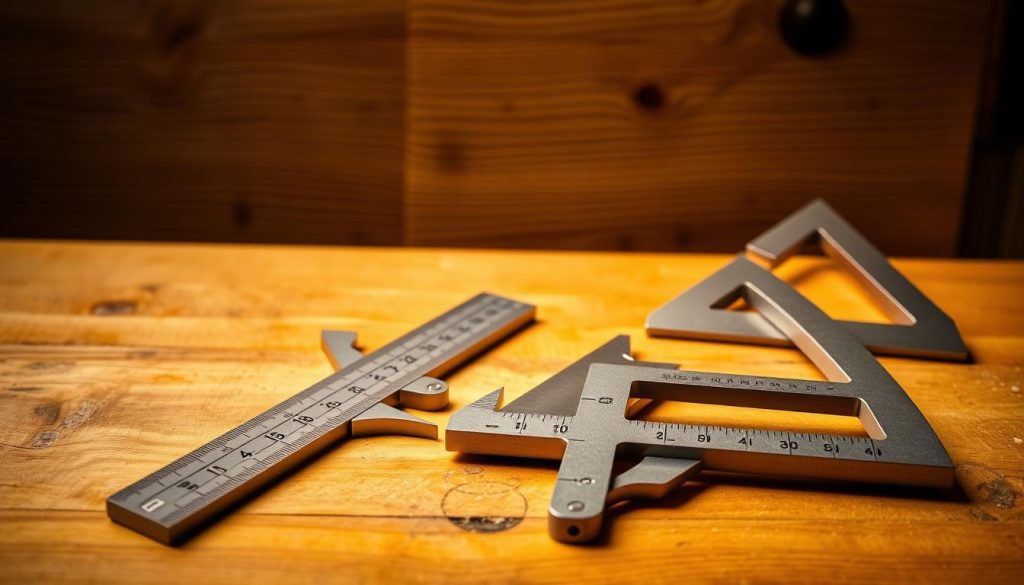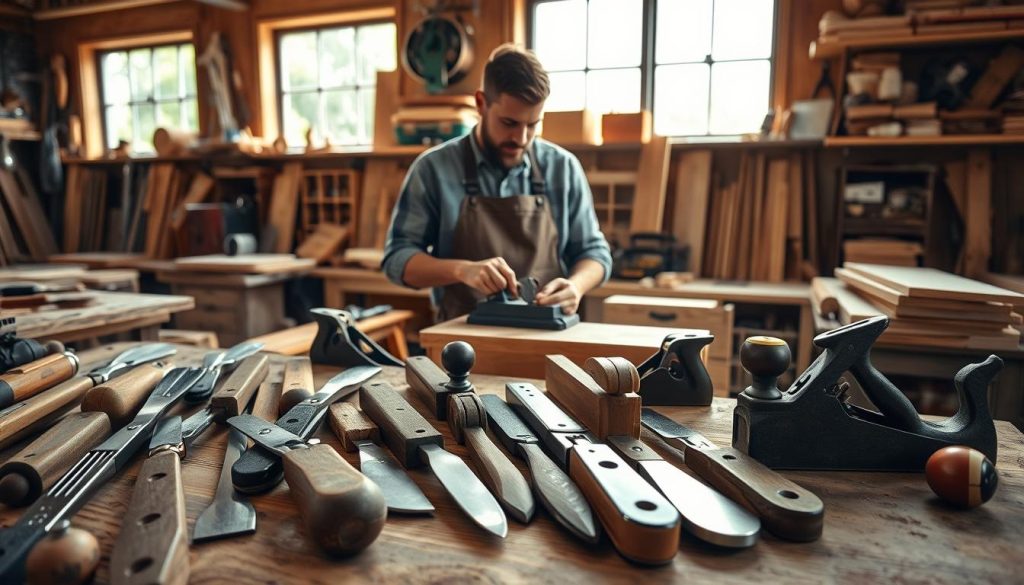Woodworking turns raw lumber into beautiful, useful items. It doesn’t matter if you’re new or have lots of experience. The right tools make a big difference in your work.
Choosing the best tools means knowing what you need. Professional woodworkers see tools as investments. They improve your work and make it more fun. From hand tools to power tools, each one is important for your projects.
This guide will show you the key tools every woodworker needs. We’ll look at different types of tools. They help you build skills and take on new projects with confidence.
Key Takeaways
- Quality tools are essential for successful woodworking
- Different projects require specific tool sets
- Investing in versatile tools saves money long-term
- Safety should always be a priority when selecting tools
- Proper tool maintenance extends their useful life
Understanding the Basics of Woodworking Tools
Woodworking turns raw wood into beautiful creations. Knowing the essential tools is key for all. These tools help cut, shape, measure, and join wood with precision and creativity.
- Hand Tools: Traditional tools that require manual operation
- Power Tools: Electric or battery-powered equipment for faster work
- Stationary Machines: Large, fixed tools for complex woodworking tasks
Essential Tool Categories
Each tool category has its own role in woodworking. Hand tools like chisels and saws offer precision. Power tools, such as drills and sanders, speed up work. Stationary machines, like table saws, handle complex cuts.
Project-Specific Tool Selection
The project type decides which tools you need. Simple tasks might need basic hand tools. But furniture making requires a wider range of tools. Beginners should start with versatile tools for various tasks.
- Small projects: Basic hand tools
- Medium complexity: Mix of hand and power tools
- Advanced work: Comprehensive tool collection
Quality tools that fit your skill level and project goals are crucial. They help you make impressive woodworking pieces with confidence and precision.
Hand Tools Every Woodworker Needs
Woodworking hand tools are key for any craftsman. Both pros and hobbyists use them to make wood into art. Knowing what tools to choose is crucial.
Learning woodworking means mastering hand tools. These tools offer control and precision that power tools can’t. Here are the must-have hand tools for woodworkers.
Saws: Cutting with Precision
There are many saws for different tasks in woodworking. Having a variety is important for success.
- Handsaw: Great for straight cuts and general work
- Dovetail Saw: Best for detailed joints
- Coping Saw: Ideal for curved cuts
Chisels: Shaping and Detailing
Chisels are vital for carving and fine details. Good chisels can greatly improve your work.
- Bench Chisel: Good for many woodworking tasks
- Mortise Chisel: For deep, square holes
- Paring Chisel: For fine, precise cuts
Planes: Smoothing Wood Surfaces
Woodworking planes make surfaces smooth and adjust wood sizes. The right plane can turn rough wood into fine material.
- Jack Plane: Good for initial smoothing
- Block Plane: Best for end grain and small adjustments
- Smoothing Plane: For very smooth finishes
Quality hand tools are key to professional results. Skill comes from practice and knowing each tool’s strengths.
Power Tools to Consider for Your Workshop
Building a top-notch woodworking space means choosing the right power tools. These tools turn simple materials into beautiful, precise pieces. They make your workshop more efficient and your projects better.
A good woodworking tool set has key power tools that boost your skills and creativity. Knowing what each tool does helps you pick the best ones.
Table Saws: The Workshop Centerpiece
Table saws are the heart of most woodworking shops. They make straight cuts, rip boards, and change sizes with great accuracy. When picking a table saw, look at:
- Motor power
- Cutting capacity
- Safety features
- Blade quality
Drill Presses: Precision Drilling
Drill presses are perfect for precise holes at exact angles. They’re better than handheld drills because they:
- Drill straight
- Control depth well
- Align holes easily
Routers: Versatile Shaping Tools
Routers are super versatile in woodworking. They make decorative edges, cut patterns, and create complex joints. Woodworkers use routers for:
- Edge profiling
- Dadoing
- Template cutting
- Inlay work
Quality power tools turn hobby woodworking into pro-level work. Do your research, compare tools, and choose the ones right for your projects.
Measuring and Marking Tools in Woodworking
Precision is key in woodworking. The right tools make a big difference. We’ll look at the essential tools for accuracy and consistency.

Getting measurements right is crucial. Quality tools are vital for woodworkers. They ensure your work is perfect, not frustrating.
Tape Measures: Your Primary Measurement Companion
A good tape measure is a must. Look for these features:
- Durable metal coating
- Clear, easy-to-read markings
- Length between 12-25 feet
- Wide blade for stability
Squares: Ensuring Perfect Angles
Squares are vital for straight lines and 90-degree angles. There are different types for various needs:
- Combination squares for multiple angle measurements
- Try squares for checking right angles
- Speed squares for quick layout work
Marking Gauges: Precision at Your Fingertips
Marking gauges help create consistent lines. They’re key for joinery and precise cuts. They ensure your projects are symmetrical.
Choosing and mastering these tools will improve your woodworking. You’ll make projects with professional precision.
Safety Gear for Woodworking Projects
Woodworking comes with powerful tools and risks. It’s key to make your workshop safe. The right tools are only useful with the right safety gear.
Choosing the right safety equipment is vital. A good woodworking setup includes protective gear to avoid injuries.
Safety Glasses: Your Visual Shield
Wood chips, dust, and debris can harm your eyes. You need safety glasses with impact-resistant lenses. Look for glasses that:
- Provide full eye coverage
- Offer anti-fog coating
- Fit comfortably with other protective gear
Hearing Protection: Preserving Your Ears
Loud tools can damage your hearing. Use earplugs or noise-canceling earmuffs. They help prevent hearing loss while working.
Work Gloves: Hand Protection Matters
Choosing the right work gloves is important. Look for gloves that:
- Offer good grip
- Are flexible for tool handling
- Protect from splinters and cuts
Safety gear is an investment in your woodworking. It lets you focus on your craft without risks.
Specialty Woodworking Tools
Adding specialty power tools to your woodworking kit can change your craft. It opens up new creative paths. These tools are more than basic, letting woodworkers handle complex projects with ease.
Professional woodworkers know that special tools improve project quality and speed. Each tool adds unique abilities, making your workshop more versatile.
Wood Lathe: Turning Creativity into Reality
A wood lathe is key for making rounded items. It lets woodworkers shape cylindrical objects like:
- Table legs
- Decorative bowls
- Spindles
- Furniture components
Band Saw: Precision Cutting Companion
The band saw is a top tool for its cutting flexibility. Woodworkers use it for:
- Creating curved cuts
- Resawing lumber
- Making detailed shape cutouts
- Working with thick wood
Miter Saw: Angle Cutting Perfection
A miter saw is all about precision. It helps woodworkers make accurate angled cuts for frames, moldings, and complex joinery. This tool ensures clean, consistent cuts, boosting project quality.
Tool Storage Solutions for Woodworkers
Keeping your woodworking tools organized is key to a smooth workshop. Woodworking pros understand that good storage protects tools and boosts efficiency. A well-thought-out list of tools and smart storage can change your workspace for the better.
Good tool storage does more than keep things neat. It prevents damage, cuts down on clutter, and makes woodworking fun.
Toolboxes and Chests
Wooden or metal toolboxes are great for protecting your tools. Look for these features in a storage solution:
- Durable construction
- Multiple compartment options
- Lockable designs
- Portability
Wall-Mounted Racks
Use wall-mounted storage to make the most of your workshop’s space. These racks keep tools in reach and organized, preventing damage and making tool access quick.
- Pegboard systems
- Custom tool hangers
- Magnetic tool strips
Mobile Carts
Mobile tool carts are perfect for those with little space or who need to move things around. These carts let you easily move your tools around the workshop.
- Wheeled design
- Multiple storage levels
- Compact footprint
Maintaining Your Woodworking Tools
Keeping your woodworking tools in top shape is key. Professional woodworkers know that well-maintained tools last longer. They also become family treasures passed down through generations.

Looking after your best woodworking tools needs a plan. This plan keeps your tools working great and saves you money in the long run.
Cleaning Techniques for Precision
- Remove sawdust and wood debris after each use
- Use specialized cleaning solutions for metal surfaces
- Apply light machine oil to prevent rust formation
- Wipe down wooden handles with protective wood conditioner
Sharpening Essential Skills
Sharp tools are safer. Dull blades need more force, which can lead to accidents. Get quality sharpening stones and learn how to keep your tools sharp.
Regular Tool Inspections
- Check for structural integrity
- Inspect handles for cracks
- Test moving parts for smooth operation
- Look for signs of wear or potential damage
Spending time on tool maintenance keeps your equipment safe. It also ensures your work stays top-notch. Regular care makes your tools better than ever.
Building Your Woodworking Toolkit
Starting a woodworking toolkit is exciting for craft lovers. Beginners can begin with a few tools and add more as they get better and take on bigger projects.
When you’re picking your first tools, look for quality and versatility. Choose tools that can do many jobs and last a long time.
Essential Starter Tools
Every woodworker needs a good set of basic tools. Here are some key tools for beginners:
- Hammer
- Tape measure
- Combination square
- Chisels (set of 3-4 sizes)
- Hand saw
- Cordless drill
Upgrading Your Collection
As you get better, think about adding more specialized tools. Choose tools that fit your current projects and skill level.
Budget-Friendly Options
You don’t have to spend a lot to build a woodworking toolkit. Here are some ways to save:
- Buy quality used tools from trusted sources
- Look for sales at hardware stores
- Start with mid-range tools and upgrade as you go
- Join woodworking forums for tips
The best tools are those that match your skill and project needs. Focus on tools that are functional and durable, not just how many you have.
Resources for Woodworking Enthusiasts
Getting better at woodworking is more than just having the right tools. It’s about learning every day and joining a community of passionate woodworkers. They share their knowledge and inspire each other.
Digital platforms have changed how woodworkers learn and connect. Sites like Reddit’s r/woodworking and forums are great for meeting experienced woodworkers. They offer advice, show off projects, and talk about tools and techniques.
But learning isn’t just online. Magazines like Fine Woodworking and Popular Woodworking have lots of tutorials, tool reviews, and expert tips. Local workshops and classes, both in-person and online, help woodworkers learn new skills. They can master complex techniques and add to their tool collection.
Groups like the Woodworkers Guild of America offer learning paths for all levels. By spending time on education and joining the community, woodworkers can turn their hobby into a skilled craft. They can keep improving and exploring their creativity.